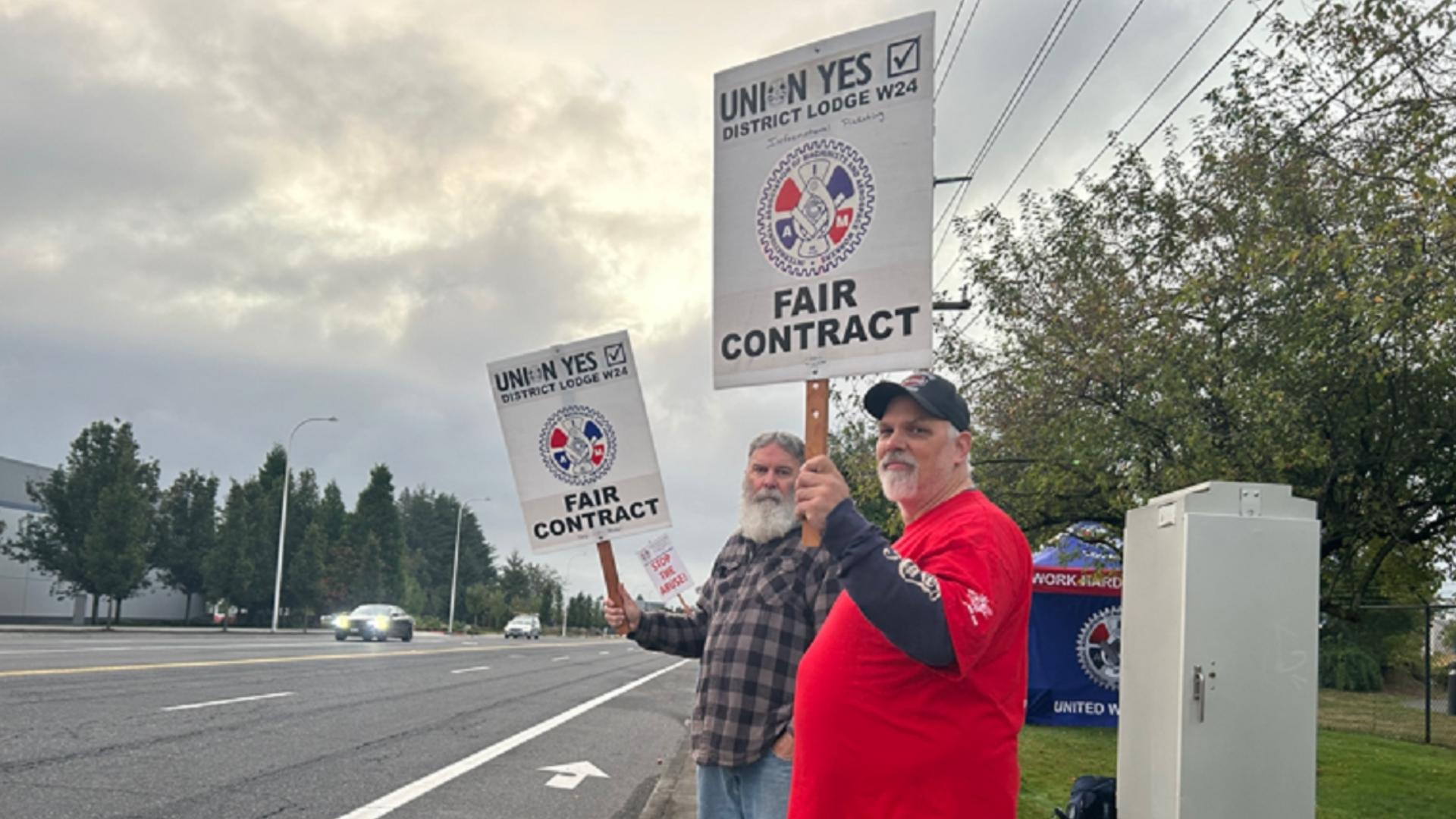EVERETT, Wash. — Boeing's largest union of more than 30,000 machinists has voted to go on strike, rejecting the latest contract offer with the company.
The contract between members of the IAM District 751 Machinists Union and Boeing has lapsed, and union members say they and the company are far apart when it comes to reaching an agreement.
What is at the heart of this contract dispute? How will the strike impact the local economy? Will employees still receive pay or benefits? Here's what we know from the company, and the union, about the strike.
Why are Boeing machinists striking?
Boeing machinists and the company were unable to come to an agreement on a new contract, with union members walking away over proposed pay increases and other aspects of the new proposed contract that they say are insufficient.
The union is seeking a 40% pay increase over the next four years - however, Boeing's counteroffer is 25%.
Among the sticking points is Boeing's refusal to restore a pension plan that was eliminated in 2014.
In a message to union members, Boeing COO and Executive Vice President Stephanie Pope called the proposed new agreement "the best contract we've ever presented," citing increased 401k contributions, and a commitment to manufacture the company's next airplane in Washington state.
In a statement from earlier this summer, the union said it was seeking "Wage increases after ten years of stagnant wages, health care plans that allow us to take care of our families, a dignified retirement plan, more say in overtime hours to achieve a better work/life balance," from the new contract.
Machinists voted overwhelmingly (94%) to reject the tentative agreement with the company.
Following the strike vote, Boeing released a statement saying:
"The message was clear that the tentative agreement we reached with IAM leadership was not acceptable to the members. We remain committed to resetting our relationship with our employees and the union and we are ready to get back to the table to reach a new agreement."
How will the strike impact Washington state's economy?
Machinists and Boeing are in agreement that a stall in the company's work will affect the entire region, where there are facilities in Everett, Renton, Auburn, Frederickson and elsewhere.
According to Boeing, there are more employees in Washington state than anywhere else in the world.
Machinists said that they will be putting less money into the local economy while they continue to strike.
"We won't be going to the store much, out to eat as much. It's going to impact all the local businesses because we have to save our money to pay our bills and feed our families," one union member told KING 5.
Depending on how the jet production delays impact plane deliveries down the road, there could also be broader economic impacts, members say.
Boeing agrees that Washington state's economy can expect to see localized impacts while contract negotiations have stalled.
"A strike would hurt local businesses of all sizes - from aerospace suppliers to restaurants to retailers," the company wrote in an FAQ on its website. "These businesses rely on Boeing's operations and Boeing employee spending."
When did the strike start? How long will it last?
The strike began at midnight on Sept. 13, when the contract between the union and Boeing officially expired. There is no set timeline for how long the strike will last.
The company said on its website, "Strikes do not usually have a predetermined end date and we cannot predict the duration of a strike if one occurs."
Are Boeing employees still getting paid? What about benefits?
Striking machinists are not getting paid while on strike. Other Boeing employees who are not part of the IAM 751 Union will be paid as normal.
Without a new contract, machinists in the union will also not accrue vacation time, be eligible for unemployment or be able to use sick leave or cash in time off while the strike continues.
If a new contract is not in place by the end of the month, company-paid healthcare benefits will end for employees and their covered family members on Sept. 30.
How are local lawmakers reacting?
Lawmakers at the city, state and federal level have chimed in on the strike, making it clear they would like to see a swift resolution in the dispute between Boeing and its machinists.
In a collective release from the mayors of Kent, Renton, Auburn and Everett - where thousands of Boeing employees live - they said, "We are hopeful they will soon reach an agreement that respects the workers and the value they contribute to Boeing and our communities."
The mayors said they were "reassured" by Boeing's commitment to build its next airplane in Washington state.
"This pledge represents decades of continued work for Boeing employees and a sustained investment in manufacturing sector jobs for our local economies," the statement continued.
Rep. Adam Smith (D-Renton) released a statement on X (formerly Twitter) saying, "I strongly urge the parties to return to the negotiating table and participate in good faith discussions that result in a strong agreement."
Smith acknowledged that large corporations have "increasingly prioritized shareholder value at the expense of workers," and urged Boeing to behave as a "responsible steward for its employees."
"I sincerely hope that the parties reach an agreement that respects all employees as well as the company as a whole," he concluded.
Governor Jay Inslee also weighed in on social media, saying, "Washington's machinists are among the most skilled in the world, and their knowledge and expertise is why Boeing is globally recognized as a world-class company. We all hope that the machinists and Boeing come to an agreement as soon as possible."
KING 5's Eric Wilkinson and Bridget Chavez contributed to this report.

